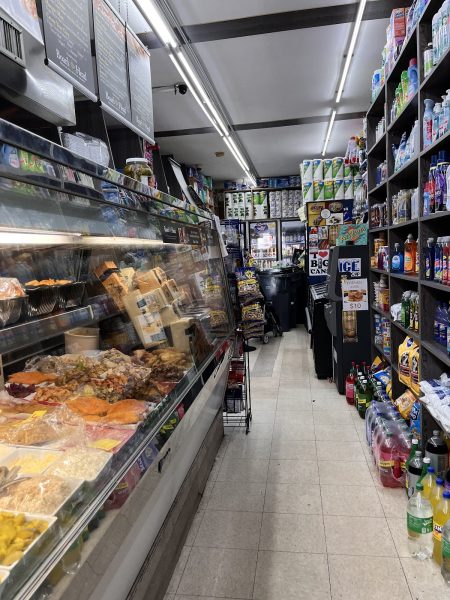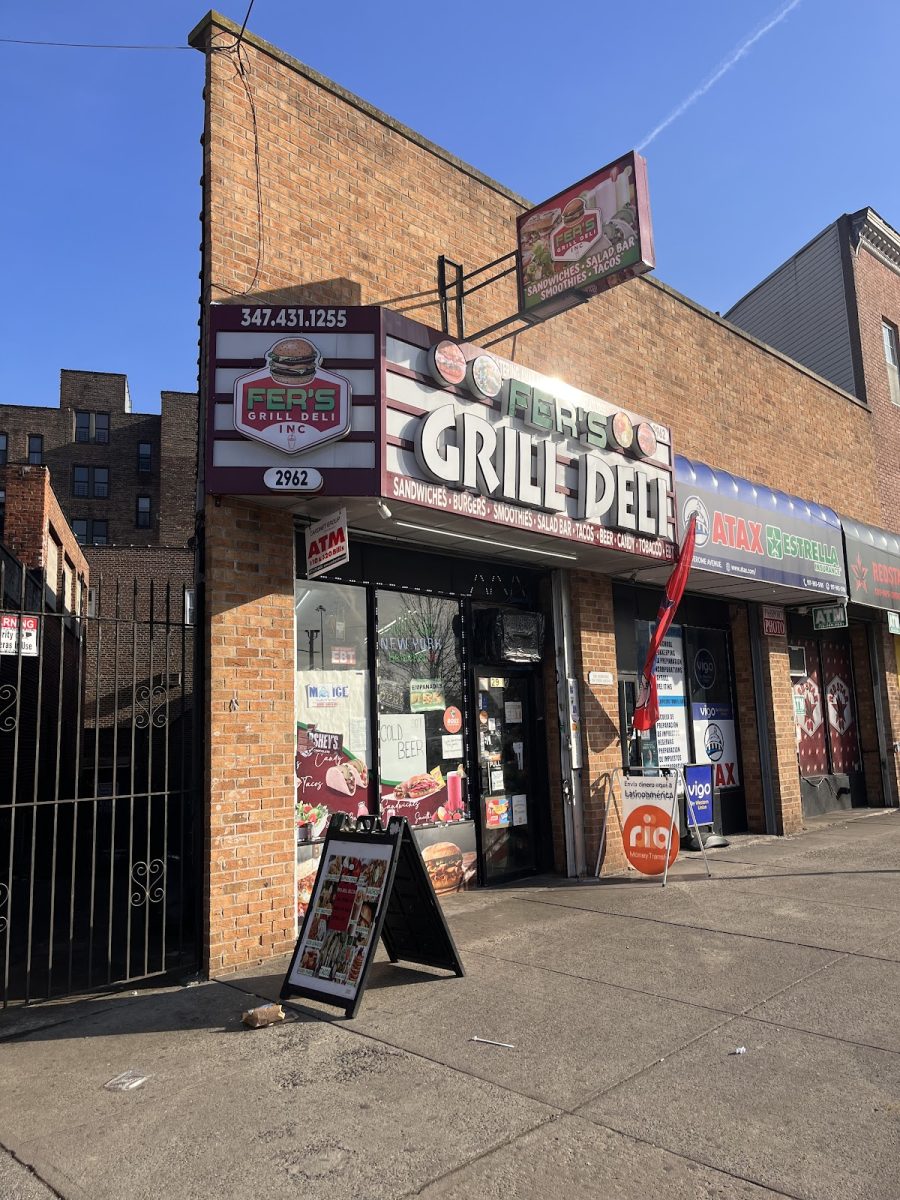Walking into a bodega is like stepping into a time capsule of New York’s history and heritage – the old meets the new in a blend of tradition and innovation. Here, amidst the rows of canned goods and household items, conversations flow freely in a medley of languages, each echoing the vibrant mosaic of cultures that define the city.
Deli and bodega culture have been staples of New York City since the mid-20th century. From the Bronx, through Manhattan, and vibrant in every other borough, bodegas are a common occurrence. These shops hold daily essentials: from snacks and drinks to household items. Highlighted by their enticing simplicity, each bodega holds stories and people unique to its store.
Each of these small emporiums differentiate themselves through experience. It can be a distinct sandwich, full of nostalgia from a chef’s home in a foreign country, or conversation with the man behind the register, bypassing language barriers, and finding yourself a new friend. Small encounters make a bodega.
Nestled in the depths of the Bronx lies Fer’s Grill Deli, a cornerstone of the Bedford Park community presenting itself as a Mexican-American style deli.
Fer’s is owned by a man named Fernando. Fernando immigrated to America at an early age, and initially struggled. Work was hard to find, and his family was distant. The American dream seemed like a far fetched concept. Fast forward 30 years, and Fernando owns his own bodega, providing for himself and his family. The American dream isn’t so far-fetched anymore.
I met Fernando in March of 2023. Walking into the store, I was greeted by the ring of a bell triggered from the door opening. The store was empty. It appeared like any other bodega. They all do, at first glance. In the case of Fers, what sets this bodega apart is the man behind the counter.
“Who’s hungry?” Fernando asked me joyfully.
I looked at the menu for several minutes; it presented classic and unique sandwiches, some sharing the name of prominent areas throughout the city and world. The shop sells sandwiches by the names of ‘Harlem Time,’ ‘Bedford Park,’ and ‘Times Square.’ I had found the soul of the bodega.
Through the next eleven months, Fer’s became a daily lunchtime destination of mine, and Fernando became a friend. I began to view Fer’s as a reflection of the ideal New York City bodega.
Language barriers have always affected my conversations with Fernando. His English isn’t perfect, and my Spanish is not nearly conversation-level. On February 26th, 2024, I stepped foot into Fer’s hoping to learn the complete story of Fernando. Language stood as a small obstacle between us, as he discussed past experiences. I found it to exemplify the multicultural community presented by Fer’s.
Fernando briefly discussed his childhood. He immigrated at the young age of 13 and was immediately introduced to bodega culture in New York. “I’ve been cooking all my life. I love it. 30 years. It was the first job I could get when I moved here,” Fernando said. He has worked in a variety of bodegas since.
In Fernando’s last bodega, before opening his own, he worked in a Harlem located store next to Columbia University. “In New York, all schools help deli business. Middle school, high school, college. Especially college.” Fernando said. “It was kind of bad at first, because I thought I was leaving behind all the nice college kids from Columbia, but then I came here and the school community was amazing, man.” When discussing the location of Fer’s, he said, “In this area, it is nice, we have students from many different schools, and families. It was tougher in Harlem, and I don’t know about other places in the Bronx, like the Grand Concourse, but it is great here, especially with the schools.”
The creation of Fer’s was of an ordinary manner. There was nothing particularly eye-catching. In an area somewhat secluded from restaurants and stores, all grand openings raise eyes. When I first saw the store front of Fer’s, it didn’t appear to be special. It looked like an average bodega. I then entered and met Fernando. He smiled behind the counter. Fifteen minutes later, I walked out, completely in love with the store.
To me, Fer’s simply opened. It appeared. Through months of dialogue with Fernando, I was made aware of the store’s complete backstory. When Fernando worked his last job, with a role at the Harlem deli, he was just an employee. That was his whole life. “I used to pray to God every day. I worked [hard], man. I just wanted my own store. It was always expressed in my prayers.” The owners of Fernando’s previous bodega held ownership in a multitude of stores, one of which was a smoke shop on 2962 Jerome Avenue. “I was in the store one day, and I heard my bosses talking about how they were closing their shop in the Bronx because it wasn’t making anything. So I went to them, and asked them, I was like, ‘You guys think I could take it over as a deli?’ It was my opportunity, man. It was like God really heard me.”
Experience exemplifies the complexity of bodegas. I treasure my conversations with Fernando and the other store employees as a significant part of my experience within the store, and believe many others would agree. An aspect of experience that consistently goes unrecognized with Fer’s and a large variety of small businesses is the compelling confrontation of other cultures. I grew up in the center of Manhattan. The area surrounding me was not as diverse as other parts of the city. Therefore, I was never constantly exposed to cultures different from mine. Fifteen minutes at Fer’s presents numerous Spanish conversations, behind the counter and in front, and distinct Hispanic snacks and beverages. To label this as an eye opening experience is an overstatement, yet the gradual normality of these situations is something I adore.
When Fer’s first became a constant destination of mine after school, I became obsessed with a quirky concept demonstrated there. Most New York bodega menus hold the same essential sandwiches: a chopped cheese, chicken cutlet on a roll, or a bacon egg and cheese. Fer’s does it differently. As mentioned, the shop sells sandwiches by the names of ‘Bedford Park,’ ‘Harlem Time’ and ‘Times Square.’ The list of location based sandwich names goes on. These are all the same sandwiches as the classics, yet they each have a small spin to them. For example, the Harlem time is a chopped cheese with French fries in it.

The inspiration behind these names is one of the most interesting things I discussed with Fernando. Given that Fernando has experience working bodegas all throughout the city, he has a proper sense of the culture variety from location to location. People in different parts of New York City hold very different food orders. “With the ‘Harlem Time’ sandwich, I created it based on the people there in Harlem. When I used to work down there, people would get fries on their chopped cheese, and always get ketchup and mayo. So, I decided to make that a real sandwich.” Fernando had the same type of inspiration for most of his other sandwiches.
When I walk into Fer’s, a sense of normality and comfort that is perpetuated by the family-like culture approaches me. Every one of Fernando’s employees were hired because of their relationships with him. They are his friends or family of his friends.
“I remember when I first came here. I had no family, and no one wanted me to work for them. It was hard, man. So now I have the family of friends come and work for me on their own hours. A lot of them are students and need money for their education, so I let them come in and help me out around the store and pay them for the time they do.” Fernando speaks with a genuine and sincere tone.
Experience and culture. The two defining characteristics of a bodega are reflected amongst Fernando’s store. One subway ride away, and you will find yourself in a completely different atmosphere, yet you are still just in a bodega.
Experience exemplifies the complexity of bodegas.

